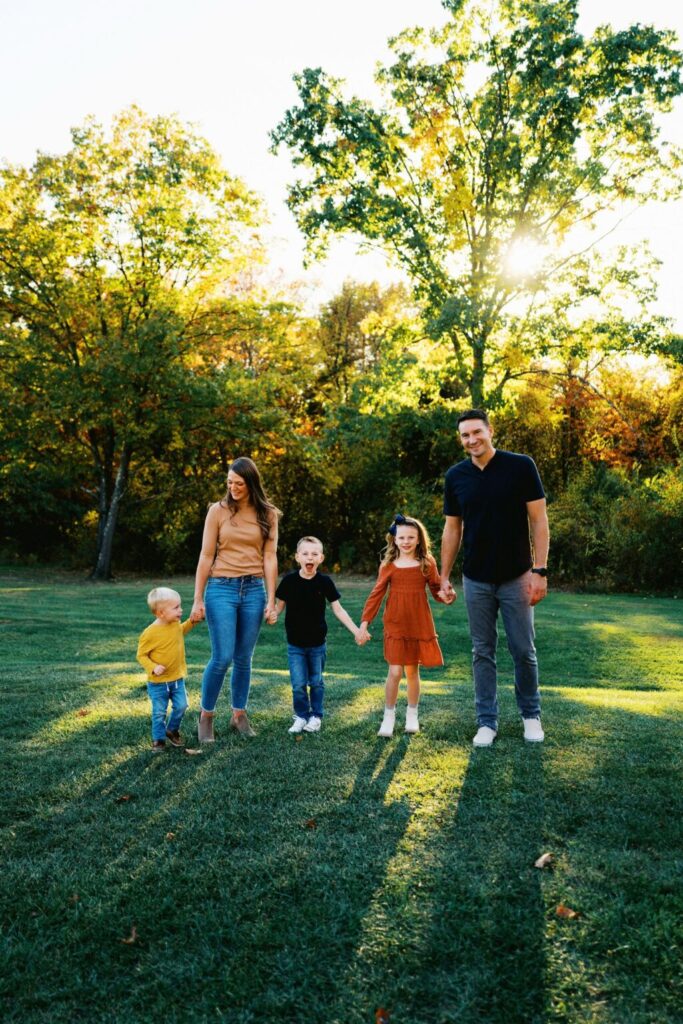
Dr. Jennifer Briggs wears more hats than we can count — and somehow manages to pull them all off with a smile. By day, she’s a dedicated researcher at the University of Pittsburgh, digging into data with the same enthusiasm she brings to organizing PTA events as co-vice president. By evening, she’s coaching her daughter’s cheerleading squad, juggling homework and activities for three active kiddos and still finding time to be the go-to friendly face in every room, whether she’s on campus at Pitt, on the sidelines at a game or chatting at a school event.
She lives in Robinson Township with her husband, Rob, and three children, Isla (8), Brady (6) and Cooper (3).
With your background in developmental psychology, do you ever find yourself analyzing your own parenting in real time?
More often than I’d like to admit! It also reminds me how difficult it can be to put “best practice” into “real practice”! I know all the research on gentle parenting, developmental milestones, social emotional learning … and sometimes I still do the opposite. But that’s the reality of parenting, and truthfully it makes me a better practitioner — the ability to say,“It is really hard sometimes” and “You are the expert of your child and family” … and to mean it! It’s important to offer grace to ourselves and our children, and to balance what the research says our kids need with what we, as parents, know our kids need (… like one extra episode of “Bluey” or a popsicle before dinner).
What does supporting literacy look like in your home?
This is another balancing act for me! I’ll often catch myself turning read-alouds into teaching moments, pointing out letter sounds/combinations, probing on vocab, and while that’s fine sometimes, it’s important to remember that literacy is so much more than just phonics and comprehension. It’s talking, singing and playing. It’s reading the same story again and again before bed. Right now, I’m reading the Harry Potter series to my kindergartener. While it’s well above his reading level, he loves the characters and the storyline. We’re spending quality time together, and he’s getting access to high-level vocabulary and rich opportunities for meaning-making. A win-win!
What advice can you share for parents trying to raise readers in a screen-heavy world?
The first thing I’d say is that we need to check ourselves. How often do our kids see us reading vs. on devices?
Then, I’d add that, as parents, our job isn’t necessarily to teach our children how to read, rather it’s to help them fall in love with reading. We can find books that are mirrors (aligned with their interests so they can see themselves in the story) and windows (opening new worlds and experiences) that make reading fun!
Lastly, screens aren’t necessarily the enemy! Our kids are growing up in a digital age, so finding ways to use screen time to support reading development (apps, digital books, etc.) is a great option, too!
You’ve worked as a special education coach. How has that experience shaped how you advocate for your own children?
When it comes to advocacy, I have learned the power of push and pull. You have to know what your non-negotiables are for your child’s education. Particularly when it comes to school systems, parents have more agency than they think. When I worked in special education, I found that many parents didn’t know their rights, the available resources or that they had access to trained advocates. Having this knowledge certainly helps me as I think about advocacy for my own kids, but I’m also making it a point to teach them how to advocate for themselves and others along the way.
Your research centers on equity and social justice. How do those values show up in your life raising a family?
We are unapologetic in our commitment to raising kids who aren’t afraid to stand up for what they believe in. We are constantly in conversation with our kids about seeing and naming differences as a point of connection, instead of the standard “We’re different, but we’re all the same” message. We talk about race, gender, disability, body size and the way these and other identities might shape someone’s experience in the world. We have the tough conversations, and we welcome the hard questions because we know from research that that’s what makes the most difference for young kids.
What’s something your kids have taught you that you didn’t learn in school?
All sorts of different ways to do math. (Seriously!)
You and your husband both coach your kids’ sports. What’s it like managing that level of involvement with three kids [8 and younger]?
It’s crazy! But I don’t think we’d have it any other way. My husband and I are doers. We rarely sit and rest, and if we had the time to, I’m not sure we’d know how! Coaching is one way we love to spend time with our kids and be involved with things we’re passionate about as well.
What advice would you give parents who worry about achieving a healthy work-life balance?
Measure yourself by your own standards. The world will tell you that you need to be everything to everyone 100% of time. That’s simply not true. Sometimes, our kids need us more. Sometimes, work demands more. But this season is fleeting. Our kids won’t always need us in this way. Work won’t always be this chaotic … (I hope!) Life will change and shift, so just run your own race and offer yourself grace along the way.
Carrie Woodard is a National Certified Counselor, National Certified School Counselor and a Pittsburgh mama of two.
Family Favorites
Weekend Activity: If we’re not at a sporting event, we’re biking the Montour Trail or relaxing in our backyard.
Family Movie: Disney’s “Encanto”
Family Restaurant: Our kids would eat at Eat N’ Park every day if they could!
Date Night Spot: Condado Tacos!




